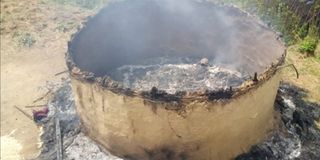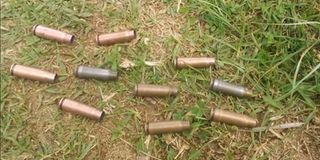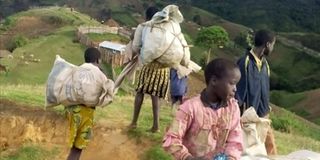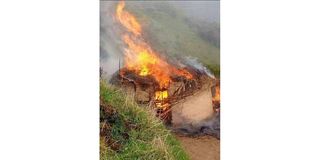Breaking: Autopsy reveals how Cyrus Jirongo died
17 families displaced in Marakwet land skirmishes

Some of torched houses still smoldering.
What you need to know:
The attackers also stole maize, beans and household items and drove away several animals.
In March 2021, over 100 houses were burned in the same area due the same land dispute.
Some 17 families in Kisimai village, Marakwet East sub-county, are spending their nights in the cold after their houses were razed in land-related inter-clan skirmishes.
The Tuesday arson attack followed a protracted land dispute pitting the Kasige clan in Endo ward against their Kamasomei counterparts in Embobut ward. The former raided the other group, burning down their houses and plundering property.
The attackers also stole maize, beans and household items and drove away several animals besides destroying other properties.

Spent cartridges collected at Kisimai village following the skirmishes.
No one was hurt in the attacks, as locals fled because the arsonists were firing in the air indiscriminately.
Embobut/Embolot Ward Representative Paul Kipyatich condemned the incident, which he termed retrogressive and deadly. He said land in Embobut is a bone of contention.
“This particular land is being claimed by the two clans, but the Kasige have been attacking the other on [claims] that their counterparts have refused to surrender it to them. This is a primitive way of resolving issues affecting society,” he said.
He urged the warring clans to use elders, administration officers and opinion leaders to arbitrate on the issues instead of resorting to violence.
“As we try to bring the two communities together, police should investigate if there is an element of incitement and those found to be fuelling the skirmishes should be brought to book,” he said.
“I call upon local elders in the two communities to sit down, embrace dialogue and bring the conflict to an end.”

Affected families leaving Kisimai area after their houses were torched.
Some of the displaced families have been given shelter by well-wishers, while others sought refuge at schools. Some were at Maron dispensary.
In March 2021, over 100 houses were burned in the same area due the same land dispute.
Mr Kipyatich said the vicious cycle is destabilising the area and backtracking development gains.
Inter-clan skirmishes are always witnessed in Marakwet East, especially during the rainy season, notably between the months of March and June.
Among the clans that have been feuding for decades are the Kapsiren and Kabisyoi, Ketut and Kasagur’ Kasegei and Katemuge; Karel and Kapkau; Kabasiran and Kapkeny; and Kakisoo and Biyaa.
Two weeks ago, a person was killed over a long-drawn-out land conflict between the Kapkeny and Kapsiran clans. This was preceded by the torching of several houses by one of the clans.
The issue had been a longstanding court battle. In November 2019, the court sanctioned the eviction of one of the clans.

One of the houses going up in smoke.
Burning houses over land disputes among the Marakwet community is a rampant age-old practice that has seen over 2,500 houses razed in the last two decades. Property worth over Sh100 million has been destroyed in the same period, according to the authorities.
More than 1,500 families have been displaced, with hundreds killed.
In 2000, over 100 families from the Kapkau clan were evicted and their houses torched. The land is still unoccupied. Kerbut Primary School was also torched in the skirmishes.
Area MP Kangogo Bowen blamed the unrelenting clashes on lack of proper land adjudication and demarcation, stating that the land is communally held through clans.
“The government should demarcate the region to stop the disputes. They should also track down all those torching individual property and prosecute them as a way of deterring the menace that has been unabated for a decade,” said the lawmaker.
Elgeyo Marakwet County Commissioner John Korir admitted the land issue in the area is a protracted matter and some cases are in court.
“The big issue aggravating the skirmishes is the land owned communally and in such times as the planting season, there is a rush for more land, resulting in the fights. We have set up a peace committee, which is at the moment in talks with the warring clans to arbitrate the matter,” he said.
The county commissioner urged locals to allow the status quo to remain and let the peace committee arbitrate the disputes.





